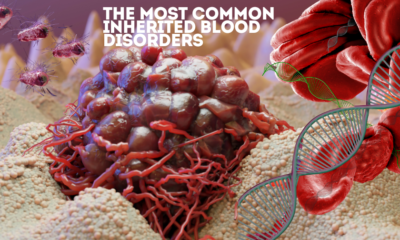Public Health
The Power of Nutrition: How Can Your Diet Protect You from Chronic Diseases?

In today’s world, where technological and lifestyle advancements have significantly influenced our everyday lives, a quiet epidemic has taken hold: chronic diseases. These long-term conditions, including heart disease, diabetes, cancer, and obesity, now account for the majority of global deaths. While genetics and environmental factors play a role, nutrition is a significant and controllable factor. The food we consume is a powerful tool that can either fortify our bodies against these diseases or contribute to their onset. Understanding the relationship between diet and chronic diseases is essential to harness the true power of nutrition for health and longevity.
A Global Health Crisis IN The Rise of Chronic Diseases
Chronic diseases have become the leading cause of death worldwide, claiming the lives of more than 41 million people each year. This trend is not confined to high-income countries; low- and middle-income nations are also experiencing an alarming rise in these conditions, often due to shifts in dietary habits and lifestyle. The World Health Organization (WHO) reports that four key risk factors; poor nutrition, lack of physical activity, tobacco use, and excessive alcohol consumption are responsible for the bulk of these diseases.
These conditions are often preventable, yet they burden individuals, families, and healthcare systems. The economic cost is staggering, with billions spent annually on managing these illnesses. Beyond the financial toll, the impact on quality of life is immeasurable, as chronic diseases often lead to a reduced ability to work, impaired physical and mental well-being, and a shortened lifespan.
Nutrition as a Cornerstone of Health
Nutrition is the foundation of health and well-being. It provides the essential nutrients needed for the body to function optimally, including macronutrients (carbohydrates, proteins, and fats) and micronutrients (vitamins and minerals). A well-balanced diet supports immune function, promotes healthy growth and development, and reduces the risk of many health problems.
However, the Western diet, characterized by high intakes of processed foods, sugars, unhealthy fats, and refined carbohydrates, is associated with the rising prevalence of chronic diseases. Conversely, diets rich in whole foods, such as fruits, vegetables, whole grains, nuts, seeds, and lean proteins, are linked to lower rates of these conditions. This contrast underscores the profound impact that diet can have on health outcomes.
The Role of Diet in Preventing Chronic Diseases
1) Heart Disease
Cardiovascular diseases, including heart attacks, strokes, and hypertension, are the leading cause of death globally. Diet plays a critical role in managing and preventing these conditions. A diet high in saturated fats, trans fats, and cholesterol can lead to the buildup of plaques in the arteries, a condition known as atherosclerosis, which increases the risk of heart disease.
On the other hand, a heart-healthy diet emphasizes the consumption of foods that support cardiovascular function. The Mediterranean diet, for example, is rich in fruits, vegetables, whole grains, nuts, and olive oil, with moderate amounts of fish and poultry. This dietary pattern has been shown to significantly reduce the risk of heart disease. Key components include omega-3 fatty acids found in fish, which help reduce inflammation and lower triglyceride levels, and fiber from whole grains, which aids in lowering cholesterol.
Additionally, diets rich in antioxidants, such as those found in berries, dark leafy greens, and nuts, help combat oxidative stress, a contributor to heart disease. Reducing salt intake can also help manage blood pressure, further protecting cardiovascular health.
2) Diabetes
Type 2 diabetes is a chronic condition characterized by insulin resistance and high blood sugar levels. The rapid rise in diabetes cases worldwide is closely linked to dietary factors, particularly the consumption of high-sugar, high-calorie diets and sedentary lifestyles.
Managing blood sugar levels through diet is a cornerstone of diabetes prevention and management. A fiber diet with low glycemic index foods such as whole grains, legumes, and non-starchy vegetables can help regulate blood glucose levels. Fiber slows the absorption of sugar, prevents spikes in blood sugar, and helps maintain a healthy weight, which is a critical factor in preventing type 2 diabetes.
Incorporating lean proteins and healthy fats, such as those from fish, nuts, and seeds, can also support blood sugar control. Conversely, reducing the intake of refined sugars, sugary beverages, and processed foods is essential. These foods contribute to weight gain and increase the risk of insulin resistance.
3) Cancer
Cancer is a complex group of diseases with many possible causes, including genetic, environmental, and lifestyle factors. Diet contributes to approximately 30-40% of all cancers. Specific dietary patterns have been linked to an increased risk of particular cancers, while others may offer protective benefits.
Diets high in red and processed meats have been associated with an increased risk of colorectal cancer. In contrast, a diet rich in plant-based foods, such as fruits, vegetables, and whole grains, has been linked to a reduced risk of various cancers. These foods are high in fiber, vitamins, minerals, and antioxidants, which help protect cells from damage that can lead to cancer.
Cruciferous vegetables, such as broccoli, cauliflower, and Brussels sprouts, contain compounds like sulforaphane, which have been shown to have cancer-protective properties. Similarly, foods rich in lycopene, such as tomatoes, and flavonoids found in berries and green tea have been linked to lower cancer risk.
4) Obesity
Obesity is a significant risk factor for several chronic diseases, including heart disease, diabetes, and certain cancers. It is primarily caused by an energy imbalance between consumed and expended calories. A diet high in calorie-dense, nutrient-poor foods, such as sugary drinks, snacks, and fast foods, contributes significantly to weight gain.
Adopting a balanced diet rich in whole foods can help maintain a healthy weight. Foods that are high in fiber, such as fruits, vegetables, and whole grains, promote satiety and reduce overall calorie intake. Lean proteins and healthy fats also play a role in weight management by supporting muscle mass and reducing hunger.
Portion control, mindful eating, and reducing the consumption of high-calorie, low-nutrient foods are essential strategies in the fight against obesity. Incorporating physical activity into daily routines enhances weight loss and helps prevent obesity-related chronic diseases.
Nutritional Strategies for Chronic Disease Prevention
1) Emphasizing Whole Foods
A diet based on whole foods as close to their natural form is a cornerstone of chronic disease prevention. Whole foods are nutrient-dense, providing essential vitamins, minerals, fiber, and antioxidants without added sugars, unhealthy fats, or excessive sodium. Emphasizing fruits, vegetables, whole grains, nuts, seeds, lean proteins, and healthy fats can help reduce the risk of many chronic diseases.
2) Reducing Processed Foods
Processed foods often contain high levels of added sugars, unhealthy fats, and sodium, contributing to chronic diseases. Reducing the intake of these foods can have a significant impact on health. This includes cutting back on sugary drinks, snack foods, fast foods, and ready-made meals, often high in calories but low in nutritional value.
3) Incorporating Healthy Fats
Not all fats are created equal. While saturated and trans fats are linked to increased heart disease risk, unsaturated fats, such as those found in olive oil, avocados, nuts, and fatty fish, have protective effects. These healthy fats can help reduce harmful cholesterol levels, support brain health, and reduce inflammation, all of which contribute to chronic disease prevention.
4) Balancing Macronutrients
A balanced diet includes a healthy proportion of carbohydrates, proteins, and fats. Carbohydrates should primarily come from whole grains, fruits, and vegetables rather than refined sugars and processed foods. Proteins should include a mix of plant-based sources, such as beans, lentils, and nuts, as well as lean animal proteins like fish and poultry. Healthy fats should be incorporated from sources like olive oil, avocados, and nuts.
5) Ensuring Adequate Micronutrient Intake
Vitamins and minerals play crucial roles in bodily functions, and deficiencies can contribute to chronic diseases. For example, low levels of vitamin D have been linked to osteoporosis and certain cancers, while inadequate iron intake can lead to anemia. A diverse diet that includes a variety of fruits, vegetables, lean proteins, and whole grains can help ensure adequate micronutrient intake.
6) Adopting Dietary Patterns Over Restrictive Diets
Rather than focusing on restrictive diets, which can be challenging to maintain long-term, adopting overall dietary patterns such as the Mediterranean or DASH (Dietary Approaches to Stop Hypertension) diet can be more effective. These patterns emphasize whole foods, healthy fats, and a balance of macronutrients, supporting long-term health and chronic disease prevention.
The Role of Lifestyle and Environment
While diet is a powerful tool in preventing chronic diseases, it is not the only factor. A holistic approach to health includes regular physical activity, adequate sleep, stress management, and avoiding harmful habits like smoking and excessive alcohol consumption. These lifestyle factors work synergistically with nutrition to enhance overall health and reduce the risk of chronic diseases.
Additionally, the environment plays a significant role in dietary choices. Access to healthy foods, food affordability, education, and cultural norms all influence eating habits. Addressing these environmental factors is essential for promoting healthier diets on a broader scale.
Challenges and the Path Forward
Despite the clear benefits of a healthy diet, many people struggle to make optimal dietary choices. Barriers include the availability and cost of nutritious foods, lack of nutrition education, marketing of unhealthy foods, and the fast pace of modern life, which often leads to reliance on convenience foods.
Addressing these challenges requires a multi-faceted approach, including public health initiatives, policy changes, and individual efforts. Governments can play a role by implementing policies that promote access to healthy foods, such as subsidies for fruits and vegetables, taxes on sugary drinks, and regulations on food advertising. Schools and workplaces can also support healthier choices by providing nutritious meal options and nutrition education.
At the individual level, making small, sustainable changes can lead to significant improvements in health. This can include gradually incorporating more whole foods into the diet, cooking at home more often, reading nutrition labels, and practicing mindful eating.
Conclusion
The power of nutrition in protecting against chronic diseases cannot be overstated. A balanced, nutrient-rich diet can reduce the risk of heart disease, diabetes, cancer, and obesity, among other conditions. While genetics and other factors play a role in the development of these diseases, diet is a modifiable factor that is within our control.
Individuals can take proactive steps towards better health by emphasizing whole foods, reducing processed foods, and adopting healthy dietary patterns. Coupled with a healthy lifestyle and supportive environment, nutrition has the potential to transform health outcomes on a global scale. As we continue to face the growing burden of chronic diseases, the role of nutrition will remain a critical factor in the pursuit of a healthier, longer, and more vibrant life.








































